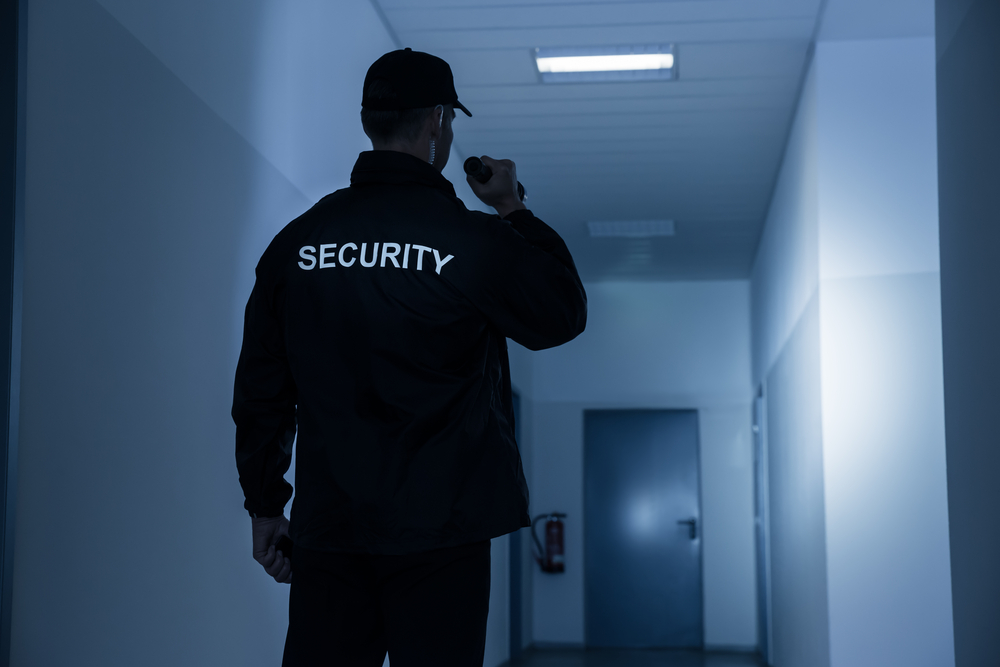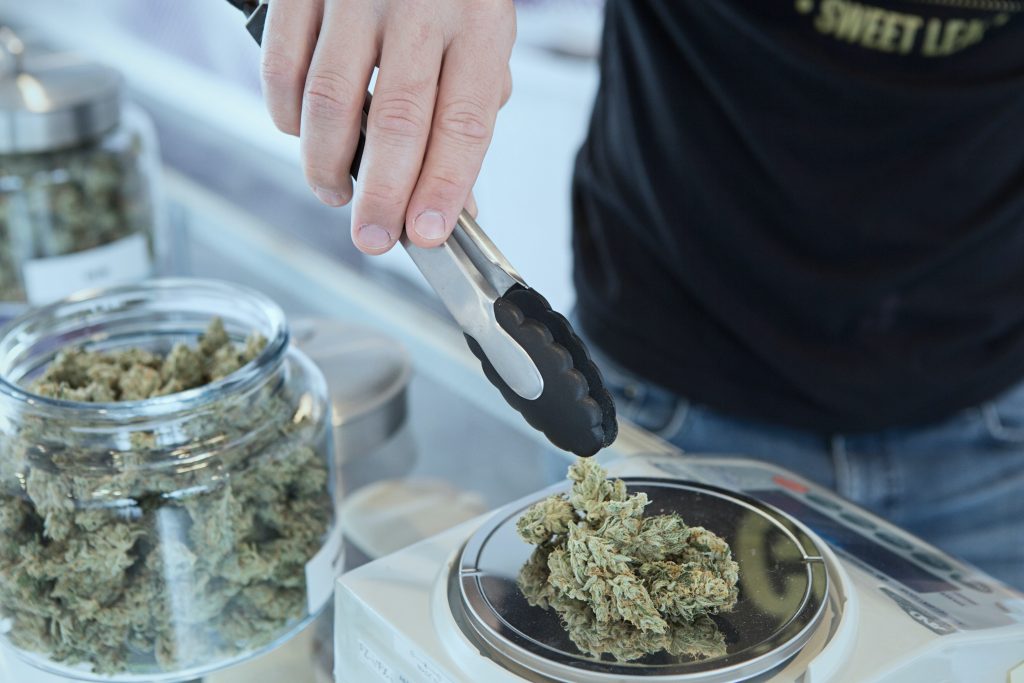Dispensary Security Solutions
Refining Industry Standards
Every business needs security and some industries require more robust security measures than others.
The very nature of the cannabis industry dictates that dispensary security solutions are not only absolutely necessary but are also required by state and local agencies for the purposes of obtaining a license to operate in a given location.
As anyone in the industry knows, cannabis possession and use are still illegal under federal laws. However, licensing and operating regulations for those states that have deemed them to be legal in their jurisdiction are handled on a state-by-state basis.
For example, many states and municipalities have specific requirements for the proper use of video surveillance.
According to a 2021 article at Investopedia, “The U.S. remains a highly complicated space for cannabis companies and investors, in large part because, while cannabis remains illegal at the federal level, a growing number of states have allowed cannabis companies thanks to local legalization decisions.
For cannabis companies looking to expand into the U.S. market, it’s not so easy as simply setting up shop in a state which has legalized cannabis. Companies are forced to deal with myriad legal and financial barriers, with many companies having to seek out capital from Canadian investors, as Canada has legalized cannabis and the industry is already finding a structure for itself with many companies operating.
Another issue facing the U.S. market is banking. Congress has yet to lift banking restrictions on cannabis, meaning firms have little access to capital and have to rely on cash, which has limited the potential for expansion among U.S.-based cannabis firms.”
This last issue has a very real impact on a cannabis facility’s ability to purchase and install the necessary security measures, among other things.
The Problem of Cannabis Industry Security
As of 2021, cultivation, promotion, and sales of marijuana for medical use was legal in 29 states in the United States and the District of Columbia. In addition, eight states and the District of Columbia had legalized recreational use of cannabis products.
Medical and recreational cannabis product sales are projected to reach as high as $61 billion by 2024 in the United States and are anticipated to have a total economic impact of over $90 billion.
And, as more states are likely to pass legislation, sales for recreational use are expected to outpace sales for medical use over time.
Security protocols in the cannabis industry currently vary from state to state, and even from city to city. And, as municipalities and jurisdictions continue to draft their own set of protocols and requirements, there is no single set standard for the industry.
Yet, it goes without saying that dispensary and grow facility security in the cannabis industry is a pressing concern.
According to a post at Security magazine,
“Cannabis growing facilities and dispensaries need sophisticated security plans for a myriad of reasons. The products on sale, the funds on site and other valuables in the facility demand protection. In addition to keeping compliance top of mind, cannabis cultivators operate in a high-value product and a cash-intensive business, making them ripe targets for thieves. Intrusion detection is a critical component of a security system.
And, because the cannabis industry is growing so rapidly, the security plan and the system should definitely be scalable so more stores and cultivation locations can easily be added as needed.”
A cannabis security plan is required for state licensing applications. To the dismay of many in the industry, these security plans can often exceed 50 pages in length and comply with the protocols of the state. Essentially these documents must document every rule, regulation, policy, and procedure that will be implemented to reduce business and legal risk.
While video surveillance security systems can help cannabis facility operators protect their retail stores, merchandise, warehouses, and growing operations, they are also required by state law.
In addition, each state has specific mandates for video surveillance systems.
Perhaps more than any other aspect of security for those in the cannabis industry, theft is the number one problem. According to risk management software firm Resolver,
“Of all retail businesses, cannabis companies are especially vulnerable to theft both inside and outside of their business.
As with most retail businesses, in-store theft is a constant threat to day-to-day operations. Shoplifting, robberies, and break-ins, while unavoidable, can be decreased through well-thought-out floor plans, employee training, and thorough security protocols.
Cannabis companies need to ensure an additional level of security when cannabis is in transit. Whether it’s the product moving from the supplier to the retailer or from the retailer to the consumer, the product is vulnerable to in-transit theft which could result in black market selling or worse, product tampering.
Almost all theft in cannabis companies is internal. With easy access to product, the ability to process discounts, and all-around knowledge of how the business operates, employees are the top culprits for theft. According to one report, in a $700 million market such as Colorado, employee theft amounts to almost 2-3% of that.”
The Challenge of Cannabis Industry Security
Because the cannabis industry is vulnerable to theft from both inside and outside the business, the challenge for those responsible for security is to minimize the possibility of theft as much as possible.
As one security source explains, “Most cannabis regulations specify the tracking of all people and their movement throughout a facility. This becomes a daunting task when certain multi-use cannabis facilities or campuses include retail, growing and processing all within hundreds of yards of each other. Thankfully, most electronic access control systems and accessories provide this ability along with scalability and the audit trails that cannabis regulations require.”
Consequently, simply relying on security guards or the presence of a camera system is often far from sufficient and there are numerous security risks that can plague a cannabis facility.
Some of the most common security risks that cannabis businesses face include:
Noncompliance with product security requirements
A common problem in many shops is the failure to properly secure products at the close of each business day. This can often be mitigated by establishing in-house security teams to manage compliance.
However, it’s also important to keep in mind that different states have different regulations for securing product and cash at cannabis facilities. For example, some states require vendors to have an 800-pound vault for securing products.
Buildings or business operations that leave the business exposed to theft
This can often be resolved by installing more comprehensive security camera and alarm systems. Because of the unique demands of a cannabis facility, security systems are best installed by companies with previous experience with the cannabis industry.
Additional security measures can include additional interior cameras, a secure check-in system for entering the building and having a dedicated security staff that is uniformed and possibly armed.
Inadequate screening of new employees prior to employment
A fundamental procedure should be the vetting of potential hires with background checks. These can help identify potential issues and most states also have their own regulations and compliance rules for hiring. In addition to background checks, some companies also run credit checks.
None of these steps are unusual or extraordinary in today’s employment environment. However, skipping or bypassing these procedures can lead to unwanted problems.
Insufficient employee security protocols
A common example is failing to check employees and their backpacks, purses, or other bags as they enter and exit the facility or workplace.
There are relatively simple procedures and policies that can be implemented that will help mitigate any potential employee theft problems. Implementing mandatory check-in and check-out processes for each room and shift change should be considered. In addition, consider providing employees with work attire to be worn during work hours and stored on-site.
On Site Security Guards and Building Security
Making use of a full-time, professional security guard in a facility is becoming quite common in the cannabis industry. As a result, there are numerous security firms that specialize in providing uniformed security personnel for cannabis dispensaries and related facilities.
It is a sobering aspect of the cannabis industry in the U.S. that it is unnecessarily risky because federal law equates cannabis finance with money laundering. As a result, many cannabis industry insiders fault federal prohibitions for making it difficult for cannabis companies to get banking services, which, in turn, forces most of them to deal with cash.
As an article from Forbes magazine points out,
“The cannabis business is booming, but this has also made dispensaries enticing to armed robbers and burglars. Weed can be easily resold illegally and most cannabis shops hold large amounts of cash.”
Unfortunately, this has led to several armed encounters in recent years between shop owners or budtenders, and would-be robbers. As the Forbes articles goes on to note,
“Armed robbers have targeted these dispensaries, seeking cash and also cannabis for resell in prohibition states like Texas and Kansas. Sometimes they encounter armed budtenders. In April, an armed suspect was shot dead in April at the Highest Choice dispensary in Ardmore, Oklahoma. Last year in Oklahoma City, a bystander was wounded in the parking lot of a dispensary called All City Plug from gunfire between an armed robber and an armed employee…”


Consequently, many cannabis workers are turning to professionals and outsourcing their onsite security functions.
While some cannabis dispensaries employ strictly unarmed security guards, some experts argue that armed guards provide a visible security presence and a stronger deterrent to armed robbery.
The Search for Effective Cannabis Industry Security
The challenge for a retail cannabis facility is similar to any other retail business – the need to maintain security 24/7. And to do so in a consistent and diligent way.
Unless a property can be monitored comprehensively and done so consistently each day and night, vulnerabilities will be exploited. And it becomes a matter of when, not if. The sobering reality of security is that it is only as reliable and effective as the gaps in coverage.
As new states continue to adopt more liberal laws regarding retail cannabis outlets, the potential for theft and burglary increases. And the nature of security, criminals and human nature is such that diligence and consistency is required to guard against attempts to breach a stores’ security.
However, few cannabis dispensaries have the budget or resources for having a live security presence on-site 24/7, for example.
And the larger the facility, and the more customers coming through, the greater the risks.
When a store is especially busy and understaffed, the threat of theft rises dramatically. And the absence of any visible security measures means that robbery is much more likely.
Beyond Locks, Alarms, Guards and Courtesy Patrols

Security strategies for most commercial properties tend to only protect a building after business hours. This may work well for industrial shops, office suites, and even some retail operations.
But not for a business that houses a highly sought-after commodity.
All cannabis dispensaries and shops require more comprehensive security measures. This is true regardless of whether it’s a small store or a relatively large facility employing many workers. Threats such as daylight robberies cannot be dismissed or ignored for example, and the very real possibility of other types of theft must be guarded against.
This is why many shops opt for a live security presence on site.
For example, one cannabis dispensary in Sparks, Nevada contracts with a local security company to have an armed and uniformed security guard in the store during business hours. And, because they also obtain identification from each customer as they enter the premises, the likelihood of petty theft through shoplifting is minimized.
In addition to making use of security guards and courtesy patrols, cannabis operations are required to install heavy-duty door and window locks, as well as alarm systems. All of these standard security measures can and do add significantly to the overall security of a cannabis outlet.
But even these efforts can fall short by themselves.
While there are variations in the legal requirements regarding placement and capabilities, the reliably effective use of video surveillance cameras is required, as well.
Cameras provide the possibility of identifying and pursuing individuals who have been recorded committing a crime. In addition, they provide store managers and security personnel with a visible deterrent as it’s been shown that people tend to avoid cameras if contemplating a criminal act.
However, it’s important to note that video surveillance and security systems have limitations.
For example, static and immobile cameras may have limited viewing range, while those without night vision or motion sensors may be insufficient to capture critical images. In addition, video cameras are passive tools. They cannot intervene, engage, or sound a warning.
And, although they can certainly be an effective deterrent much of the time, cameras also can be covered, vandalized, or even destroyed. And, with more brazen criminal elements, simply ignored.
The bottom line is that if a break-in and burglary takes place during the night, all that a store owner or manager can do the next day is review the video footage and watch the event after the fact.
Keeping Watch – Day and Night: Surveillance Cameras
Business owners and managers are almost unanimous in their belief that security surveillance systems are an absolute necessity. In fact, as we noted earlier, the benefits of having quality video cameras installed go far beyond simply surveillance.
Researchers consistently report that efforts to reduce or deter crime are complex and that relying on just one method of reducing crime is an erroneous path. However, these same researchers have determined that surveillance cameras are most effective when combined with other crime reducing or deterring methods such as improved lighting, security guards and defensible space.
According to the Municipal Technical Advisory Service, a comprehensive look at multiple academic studies found that security cameras are effective in deterring crime.
A local television station interviewed dozens of inmates serving time for burglary at the Oregon Department of Corrections. Asking them about their break-ins, they found that, in general, security cameras were a deterrent to breaking into a home.
Also, in addition to deterrent purposes, the ability to quickly and easily capture a high-quality digital record of events at your property can be critical for liability reasons, as well as for law enforcement, if needed.
For example, if a break-in or a daylight robbery is committed and recorded, the video footage may be useful for the identification and possible apprehension of the perpetrator.
As we noted earlier, it has been established that having visible cameras installed throughout a facility can serve as a passive deterrent to potential criminal activity. Criminals and others with criminal intent are highly likely to avoid detection from cameras.
Along with recorded video surveillance, a cannabis operation may choose to employ security personnel in some capacity. The options range from having uniformed, and possibly armed guards posted on-site at a dispensary, to a scheduled security check provided by a mobile security service during non-business hours.
But when it comes to choosing the best security solution, most of the typical approaches often fall short.
Uniformed security personnel have physical and logistical limitations, as we’ve noted already, and passive surveillance video cameras have limitations such as restricted visibility and range. In addition, video cameras are vulnerable to being vandalized or disabled.
And ultimately, even the most advanced cameras on the market cannot take action to stop or deter threats.
Smart Technology:
The Ultimate Solution for Comprehensive Cannabis Facility Security
AI Blackbox Technology
Active Intercept
Proactive Prevention
Advances in smart technology have paved the way for a video security system with the ability to interact with and engage individuals attempting to break in, steal property, or commit some other criminal act – and to do so in real-time.
This is made possible using a system that uses artificial intelligence, AI, to analyze and assess each event and occurrence. This “smart” system incorporates both human intelligence from a remote site, in conjunction with AI to enhance the surveillance capabilities of existing video cameras.
In other words, a smart technology video surveillance system. The good news for those in the cannabis industry is that this smart surveillance system is available from Blue Eye.
Our SmartHub will transform your existing security camera network into an interactive security system. Your cannabis dispensary’s existing cameras become sensors and our AI software enables your cameras to actively monitor your shop for illegal or prohibited activity.
Our AI process provides the system with analytics processing which can trigger a response to a security threat.
When a criminal threat or security breach is detected at your cannabis dispensary, an alarm is immediately sent to our command center. There, a highly trained Video Surveillance Technician (VST) responds to the threat in real-time by assessing the situation and taking appropriate action.
This response and action can range from simply giving a verbal warning that is broadcast over the onboard loudspeaker system, to calling the police or your contracted security guard service. What we have learned over the years is that because the direct audio system prevents incidents from escalating almost 99 percent of the time, it is rarely necessary to contact the police.
Blue Eye can work as your “security partner” and our approach of combining artificial and human intelligence will provide your cannabis dispensary or facility with a reliable and affordable solution utilizing the cameras you already have installed.
In fact, the entire system solution is far more affordable than maintaining a live security guard presence on-site.
With the enhancement of our AI software technology, your existing security cameras become sensors that allow your system to analyze and even anticipate threats in real-time. By using an interactive surveillance system powered by advanced security and surveillance technology, your video camera network is transformed into a stealth security system.
Blue Eye’s proprietary managed service platform will equip you with state-of-the-art technology and performance and provide your cannabis facility with a highly enhanced security network.
Your facility will benefit from AI-enhanced video surveillance, remote personnel maintaining video monitoring in a secure environment, and the ability to dispatch security or police to your property if needed.
By using both artificial and human intelligence, our technology provides the ultimate cannabis security guard alternative – all while utilizing the cameras you already have installed at your property.
If you would like to learn more about our unique approach to provide security for your site, call us at 855.258.3662 or email us at [email protected] and let us design an effective solution for your cannabis business!


See What Our Clients Say About Us








